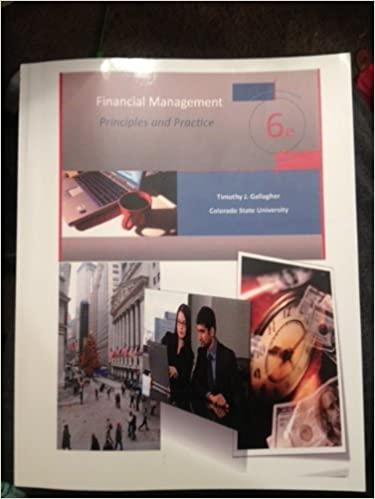Question
1. Why is it important to take into account the effect of inflation in forecasting the cash flows? Briefly comment. 2. Evaluate the profitability of
1. Why is it important to take into account the effect of inflation in forecasting the cash flows? Briefly comment.
2. Evaluate the profitability of the project with the NPV, IRR, MIRR, simple payback period, and discounted payback period methods. Is the project acceptable? Briefly explain. Why is the NPV method superior to the other methods of capital budgeting? Briefly explain.
3. Conduct the stand-alone risk analysis of the project with the sensitivity analysis and scenario analysis techniques. Explain why sensitivity analysis and scenario analysis can be useful tools in the capital budgeting decision- making process when economic and financial conditions are likely to change in the future.
Exhibit 1: Financial data Joan Hamilton plans to use in estimating VECs WACC VECs current market value optimal capital structure: Weight Bonds $30,000,000 30% Preferred Stock 10,000,000 10% Common Equity 60,000,000 60% Data to be used in the calculation of the cost of borrowing with bonds: Par value = $1,000, non-callable Market value = $1,085.59 Coupon interest = 9%, semiannual payment Remaining maturity = 15 years New bonds can be privately placed without any flotation costs Data to be used in the calculation of the cost of preferred stock: Par value = $100 Annual dividend = 9% of par Market value = $102 Flotation cost = 5% Data to be used in the calculation of the cost of common equity: CAPM data: VECs beta = 1.2 The yield on T-bonds = 5% Market risk premium = 5% DCF data: Stock price = $19.08 Last years dividend (D0) = $1.00 Expected dividend growth rate = 5% Bond-yield-plus-risk-premium: Risk premium = 3.5% Amount of retained earnings available = $80,000 Amount of new common stock to be issued = ($300,000) (0.6) - $80,000 = $100,000 This exhibit shows the data needed to estimate the firms WACC. Specifically, it first presents VECs current market value optimal capital structure used to determine the weights in the WACC calculation. It then provides the data required to calculate the cost of debt, the cost of preferred stock and the cost of common stock. The amount of new common stock to be issued is provided at the end of the exhibit.
Step by Step Solution
There are 3 Steps involved in it
Step: 1

Get Instant Access to Expert-Tailored Solutions
See step-by-step solutions with expert insights and AI powered tools for academic success
Step: 2

Step: 3

Ace Your Homework with AI
Get the answers you need in no time with our AI-driven, step-by-step assistance
Get Started


